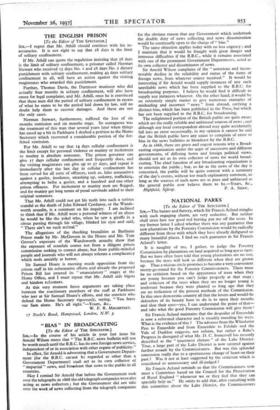" BIAS " IN BROADCASTING
[To the Editor of THE SPECTATOR.] SIR,—In the course of his article in your last issue Sir Arnold Wilson states that " The B.B.C. news bulletin will not be worth much until the B.B.C. has its own foreign news service, independent of or in association with other organs of publicity."
In effect, Sir Arnold is advocating that a Government Depart- ment (for the B.B.C. cannot be regarded as other than a Government Department) snail act as its own collector of " impartial " news, and broadcast that news to the public in all countries.
May I remind Sir Arnold that before the Government took over the telegraphs in 1868 the old telegraph companies were also acting as news collectors ; but the Government did not take over the work of news collecting from the telegraph companies
for the obvious reason 'that any Government which undertook the double duty of news collecting and news dissemination would be continually open to the charge of " bias."
The same objection applies today with no less cogency ; and I maintain that it would be fraught with great danger and immense difficulties if the B.B.C., while it remains associated with one of the prominent Government Departments, acted as . its own collector and disseminator of news.
Sir Arnold Wilson complains of the " notorious and incon- testable decline in the reliability and status of the items of foreign news, from whatever source received." It would be interesting if Sir Arnold would supply instances of any such unreliable news which has been supplied to the B.B.C. for broadcasting purposes. I believe he would find it difficult to supply any instances whatever. On the other hand, it would be an extremely simple matter to give numerous examples of misleading and incorrect " news " from abroad, carrying a distinct bias, which has been published in the Press, but which has not been supplied to the B.B.C. for broadcasting.
The enlightened portion of the British public are quite aware which are the really reliable and unbiassed sources of news ; and although any local correspondent abroad may quite accidentally fall into an error occasionally, in my opinion it cannot be said that the British public have any cause to complain of error or bias in the news bulletins as broadcast by the B.B.C.
As in 1868, there are grave and cogent reasons why a Broad- casting organisation under the aegis of successive and different governments, of differing home and foreign political views, should not act as its own collector of news for world broad- casting. The chief function of any broadcasting organisation is to entertain the public ; but, so far as the news of the day is concerned, the public will be quite content with a summary of the day's events, without too much explanatory comment, so long as the sources of such news are as pure and unbiassed as the general public now believe them to be.—Yours, &c.,














































 Previous page
Previous page